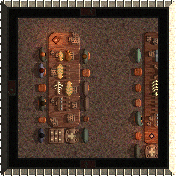Laboratory
| Laboratory | |
|---|---|

| |
| The "I'm not crazy, I'm eccentric!" location... | |
| Building Information | |
| Icon | |
| Building cost | Wood: Stone: Grand: |
| Category | Infrastructure |
| Sub-category | Knowledge |
| Produces noise? | No |
| Components | 1 |
| Expandable? | Yes |
| Component Requirements | Station: |
| Production Information | |
| Input | None |
| Output | None |
Laboratories are infrastructure buildings part of the "knowledge" sub-category. They employ citizens to gain knowledge points. The points will decrease if laboratories stop functioning. As the player's settlement grows, more types of buildings, services and technologies will be needed to maintain the ever-increasing population's happiness and production efficiency. Spending knowledge points is the only way to gain access to many important buildings and additional gameplay elements, meaning that laboratories is one of the most important buildings in the game.
If libraries are built, then laboratories can gain even more knowledge points than before. However, it only makes sense to build libraries once many well-functioning laboratories are built first, otherwise the knowledge point boost bonus given by libraries will be meaningless.
This building, at the cost of extra resources, can be upgraded. Each upgrade adds a +50% performance boost to the building. When upgraded, the aesthetics and work environment of the building will improve; the building can be upgraded twice, although each upgrade requires a technology the player must unlock. The first upgrade is the "Improved Laboratory" unlock, which costs 1,200 knowledge points. The second one is the "Advanced Laboratory" unlock, which costs 5,000 points. The first upgrade must be unlocked to be able to unlock the second.
In-game description
"In a laboratory, scientists examine nature and gain knowledge that can be spent on technologies, but must also maintain existing knowledge, leading to a cap in the amount of knowledge that can be obtained. If laboratories stop functioning, knowledge will slowly be forgotten."